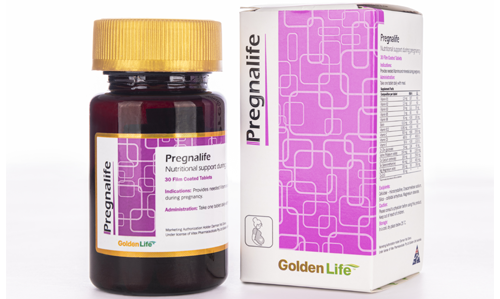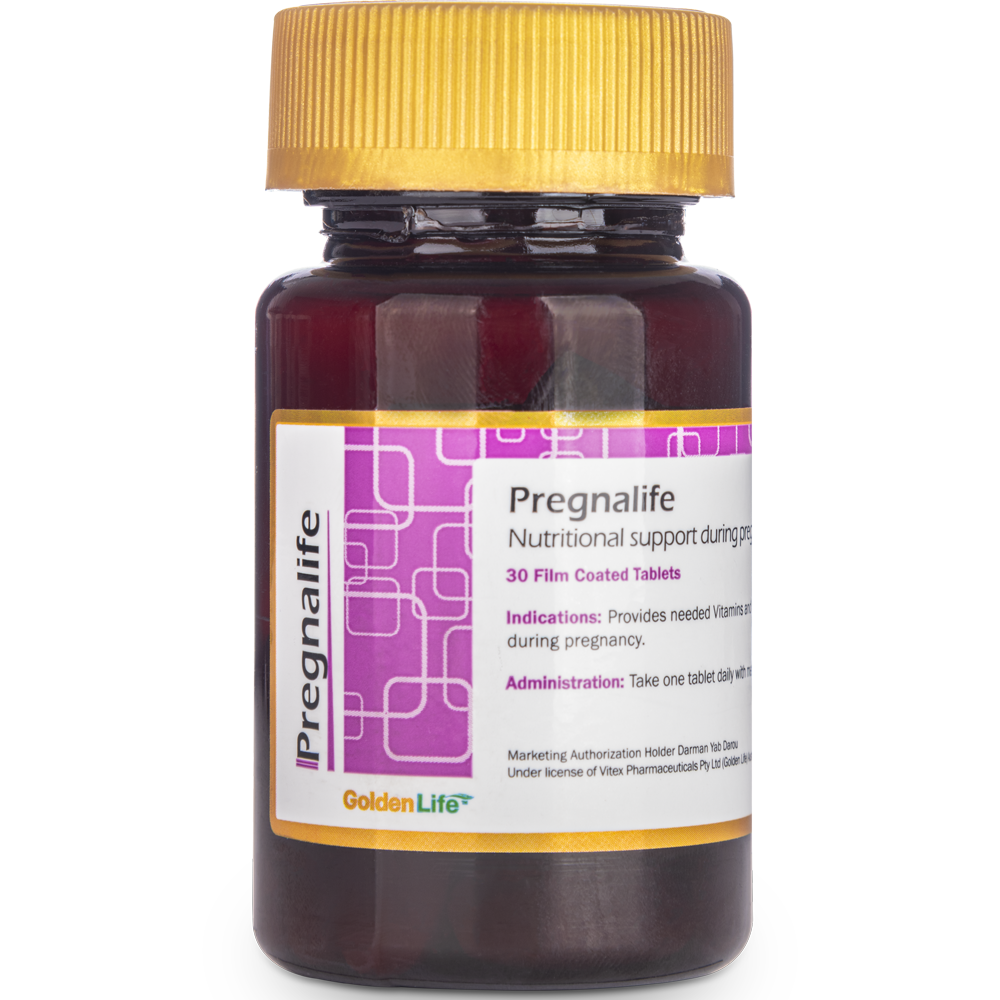Golden Life
Pregnalife


Vitamin B1
All B vitamins help the body to convert food (carbohydrates) into fuel (glucose), which is used to produce energy.
Thiamin (vitamin B1) is essential during pregnancy because it supports your baby's brain development and enables you and your baby to convert carbohydrates into energy.
Vitamin B2
All B vitamins help the body to convert food (carbohydrates) into fuel (glucose), which is used to produce energy.
Riboflavin, or vitamin B2, is essential during pregnancy because it supports your baby's bone, muscle, and nerve development. All pregnant women need 1.4 milligrams of riboflavin per day.
Vitamin B3
Vitamin B-3 has a whole host of benefits for your body; it can improve digestion, reduce nausea and take the edge off debilitating migraines. Aim for around 18 mg every day.
Vitamin B5
Vitamin B5 Pantothenic AcidPregnancy can do some strange and frustrating things to our bodies, one of which is painful leg cramps. Luckily, vitamin B5 can help to ease these cramps, so aim to consume 6 mg every day. It also has the added benefit of producing important pregnancy hormones
Vitamin B6
It's important for you, too: Vitamin B6 helps your body metabolize protein and carbohydrates and form new red blood cells, antibodies, and neurotransmitters. Some studies suggest that extra vitamin B6 may relieve nausea and vomiting (morning sickness).
Biotin
Biotin is a water-soluble vitamin that plays various biological roles through histone modification, such as immune functions and fetal growth. Mammalian maternal biotin deficiency during gestation induces fetal growth restriction. Preterm infants are known to be marginal biotin deficiency.
B12
Vitamin B12 (cobalamin) is a water-soluble B vitamin essential for red blood cell formation, neurological function, and DNA synthesis. During pregnancy, vitamin B12 it is essential for normal growth and development of the fetus, in particular neural tube formation and brain development
Vitamin C
Vitamin C supplementation may help reduce the risk of pregnancy complications such as pre-eclampsia, intrauterine growth restriction and maternal anemia.
Vitamin D3
Improve fetal growth and reduce the risks for small-for-gestational-age, preeclampsia, preterm birth, and gestational diabetes.
Vitamin E
Vitamin E is a fat-soluble vitamin with several forms, but alpha-tocopherol is the only one used by the human body. Its main role is to act as an antioxidant, scavenging loose electrons—so-called “free radicals”—that can damage cells. Vitamin is key for strong immunity and healthy skin and eyes. These are substances that protect cells from damage.
Zn
zinc supplementation may reduce the incidence or the severity of maternal infections that, in turn, lower the risk of preterm birth.
Iodine
Iodine is essential for the production of maternal and fetal thyroid hormones that regulate the development of the fetal brain and nervous system.
Calcium
Calcium supplementation improves calcium intake and consequently reduces the risk of hypertensive disorders during pregnancy.
Selenium
selenium intake is associated with increased gestational length and decreased risk of preterm delivery. In all women in the cohort, higher selenium dietary intake was associated with a reduced risk of PTB.
Magnesium
Magnesium plays an important role in nerve and muscle function and helps to maintain normal blood pressure. It also helps your baby build strong teeth and bones. Plus, research suggests that getting adequate magnesium during pregnancy can help prevent preterm labor and other pregnancy complications.
Co Q10
Coenzyme Q10 (CoQ10) is a nutrient that occurs naturally in your body. CoQ10 is also in many foods you eat. CoQ10 acts as an antioxidant, which protects cells from damage and plays an important part in your metabolism. As a powerful fat-soluble antioxidant, CoQ10 can help protect cells from free radical damage and supports metabolic function.
Supplementation with CoQ10 reduces the risk of developing pre-eclampsia in women at risk for the condition.
RDA = Recommended daily allowance
IU = international unit
UL = Upper limit
| UL | RDA (%) | Amount per Serving | Ingredients |
| * | 107 | 1.5 mg | Vitamin B1 |
| * | 107 | 1.5 mg | Vitamin B2 |
| 35 mg/day | 11 | 20 mg | Vitamin B3 |
| * | 83 | 5 mg | Vitamin B5 |
| 100 mg/day | >100 | 50 mg | Vitamin B6 |
| * | >100 | 0.1 mg | Biotin |
| * | >100 | 0.05 mg | Vitamin B12 |
| 2000 mg/day | >100 | 500 mg | Vitamin C |
| 4000 IU/day | 67 | 400 IU | Vitamin D3 |
| 1210 IU/day | >100 | 50 IU | Vitamin E |
| 40 mg/day | 136 | 15 mg | Zn (Zinc gluconate) |
| 1100 mcg /day | 68 | 150 mcg | Iodine (potassium iodide) |
| 2500 mg/day | 20 | 200 mg | Ca (Calcium Carbonate) |
| 400 mcg | 133 | 80 mcg | Se (Selenomethionine) |
| 350 mg | 55 | 200 mg | Mg (Magnesium oxide) |
| * | * | 50 mg | Co-Q10 |
- Provides needed vitamins and minerals during pregnancy
- Supports fetal growth and development
- Stimulates energy production and immune system health
Oral, take one tablet daily with meal.
Contraindications
No contraindications have been reported to date.
Pregnancy and Lactation
This product is safe to use by pregnant or lactating women.
Pregnant or lactating women should consult a physician before using this product.
Interactions
No interaction with other medicinal products has been reported to date.
No adverse effect has been reported to date.